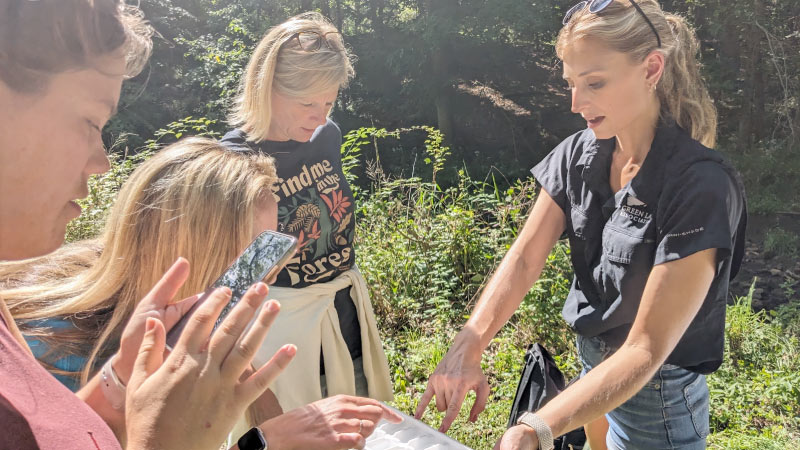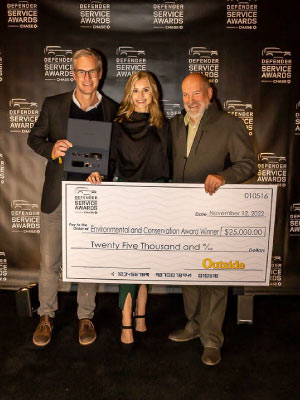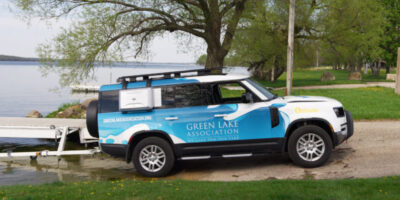
Imagine a community where people work together to preserve natural resources, protect their watershed, and learn about the importance of conservation. Educators teach students about the importance of ecosystem ecology and how it pertains to their own environment, and farmers use sustainable practices to manage agriculture. For Taylor Haag and the rest of the Green Lake community, this is the reality!
Taylor Haag is a watershed engagement manager with the Green Lake Association (GLA), a nonprofit based in Green Lake, WI. In 2022, she completed her master’s degree in environmental conservation through the Nelson Institute after graduating from UW–Madison with majors in zoology and environmental studies. Since starting at the GLA, Haag has helped manage water testing programs, promote the GLA’s education program, coordinate environmental events for the community, and even won the GLA a Land Rover vehicle.
Q: Why did you choose to study zoology and environmental studies as an undergraduate?
A: Unlike many people in this field, I always knew I wanted to study zoology. When I grew up, I really enjoyed watching documentaries on National Geographic and Animal Planet, and just enjoyed spending time outdoors. I initially came to UW–Madison to study zoology, but discovered the Nelson Institute while I was there and thought that environmental studies would be a fun, unique way to combine my interests of animals and the environment. Overall, there wasn’t anything in particular that struck me, it was just a feeling I had always had.

Q: Did your career path change at all during your education?
A: I was initially interested in learning about primates and worked at the Wisconsin National Primate Research Center. I also worked with Dr. Karen Strier, professor in UW–Madison’s anthropology department, to analyze field data she collected on northern muriqui monkeys in Brazil. She also offered several primate classes, and I took nearly every course I could as an undergraduate. I had planned to get a PhD in primatology under her mentorship, but through my two lab experiences I saw how climate and habitat degradation impacted everything so severely, and realized I didn’t want to be so niche in my career trajectory.
That’s when I discovered the Nelson Institute’s environmental conservation master’s program, where I was able to gain more professional experience with grant-writing, learning GIS, and project-based work. It was through this program that I was able to work with the North Central Region Water Network — a UW Extension project — and found a passion for learning how water resources connect to our land.
“We have a very active community and volunteers that care about the lake and are passionate about preserving it.”
— Taylor Haag
Q: What were some of your goals in pursuing a master’s degree?
A: I graduated from my undergraduate degree when everything was shut down during COVID-19 and it felt as though my experiences with jobs and internships weren’t enough to land me any entry-level positions. I wanted to use my time in graduate school to gain more real-world project experience through opportunities like the capstone project where we had the time to work with an organization to create deliverables. The real-world experiences I gained from the Nelson Institute really set me apart from other applicants while still being within the safety net of academia.
Additionally, my cohort had a wide range of people from different backgrounds — there were people like me who were already coming from science backgrounds, but also people coming from journalism backgrounds who wanted to become science reporters. There were a lot of different people with different world perspectives and job experiences, so another one of my goals was to pull as much as I could from these people with different life experiences and find my own role in the environmental field.
Q: What are some of your job responsibilities?
A: At the Green Lake Association, I have many different roles; I lead our water quality sampling programs, including both blue-green algae and spring monitoring programs. I also lead our education and volunteer programs. With our volunteer program, we have a lot of citizen science projects, such as Salt Watch in the winter, where we measure chloride levels in streams to identify salting hotspots and reduce road salt use, and in the summer we measure water clarity. In 2024, we are launching a new Nitrate Watch program in the watershed and coordinating a local group of Water Action Volunteers.
Q: What is some of the outreach you do through the education program?
A: I’m currently building our education program to be something bigger; the dream is to have people automatically associate the Green Lake Association with our education program. Right now, we offer lake classes for school groups, tailored by request, and a community class offered in the summer for anyone interested. During these classes, we get people out on the lake to talk about aquatic ecology, do secchi depth readings (which measure water transparency), have participants test dissolved oxygen, and put them in the role of scientists. We also have a second session on stream monitoring, where we do macroinvertebrate sampling where attendees can get their hands dirty. Last summer we offered the first educator program, where I invited a curriculum designer to lead our educators in developing curriculum for local students that specifically pertains to Green Lake and our watershed.

Q: Does the Green Lake Association have any other programs or events?
A: Yes, we have three large summer events that I take an active role in planning. First, we have our State of the Lake Breakfast and Annual Meeting to inform our members and the Green Lake community about the GLA’s accomplishments in the past year and share our goals for the coming year. We also have our annual fundraising event, the Lake Ball, in early August, and we wrap up the summer with our Conservation Field Day.
Q: What is the GLA’s Conservation Field Day?
A: The Conservation Field Day is an annual event for the GLA where we partner with the Green Lake County Farm Bureau to bring the community together to engage in insightful conversations about the environment and land and water resources. It’s a great opportunity for farmers and people in the agriculture community to learn about sustainable agriculture practices, and also show community members the work that’s being done in the agriculture community.
This year in particular was special because we were able to hold the Conservation Field Day at Boerson Farm, which is a regenerative farm in our watershed. The Boersons’ farm rotationally grazes a beef herd, has no-till vegetables (which helps prevent soil erosion and chemical runoff), is a certified organic farm, and participates in a farm share program. In the morning of the Conservation Field Day, we had four stations — one on their grazing, one on their no-till vegetables, one with a pasture soil pit, and one on conservation easements. Our lunch also used meat and vegetables from Boreson Farm, so everything we ate was grown right there and it really tied our conversations on land stewardship back to the community. In the afternoon we held a pollinator walk session, where a pollinator specialist talked about the importance of pollinators to our ecosystems and to agriculture. It all showed how amazing the outcomes can be when you take care of the soil and farm sustainably.

Q: Can you explain the Land Rover™’s Defender Service Award that you helped the GLA win?
A: Soon after I started at the GLA in August 2022, I read an article about how nonprofit environmental organizations had won Land Rover™ vehicles the previous year. I thought it was a really cool opportunity, so I brought it to the GLA’s chief executive officer and she gave me the go-ahead to apply for it. She later told me that she thought it was a one-in-a-million chance but didn’t want to crush my enthusiasm since it was only my second week there! We filmed a video explaining what the GLA is as an organization, the world we do, and how this vehicle could help us expand our mission.
A month after submitting our video, we heard that we were one of five finalists in the environment and conservation category, and from there it went to a public vote. We sent emails, printed postcards that were put in pickup orders at grocery stores and did all sorts of things to spread the word. Thankfully, it worked! We became a top-two organization, and I was able to travel to New York for the Defender Service Awards Banquet. At the awards ceremony, it was announced live that the GLA won the Land Rover™! It was truly incredible and I can’t emphasize enough how grateful we are to the community. The vehicle has been extremely valuable for transporting equipment to all of our field projects and events.
Q: What are you most proud of so far in your career?
A: I’ve been with the GLA for a little over a year and a half, and I’m proud of what I’m helping build in the Green Lake Watershed. We have a very active community and volunteers that care about the lake and are passionate about preserving it. I’m excited to share lake classes, host events like the Conservation Field Day, and bolster up our education and volunteer programs to be engaging with people who are invested in the health of this lake and watershed. I have a lot of hope for what I can accomplish in my career and I’m looking forward to continuing learning more and setting even higher goals.